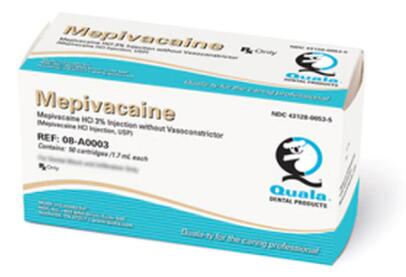Mepivacaine: mechanism of action, clinical applications and safety
General Description
Mepivacaine is a widely used local anesthetic belonging to the amide group. It works by blocking nerve impulses through sodium channel inhibition. With a rapid onset and intermediate duration of action, it is commonly used for regional anesthesia and nerve blocks. Mepivacaine has a favorable safety profile when used appropriately, with a low incidence of systemic toxicity and allergic reactions. It should be used with caution in certain medical conditions and hypersensitivity cases. Proper administration techniques and adherence to safety protocols are crucial. Overall, mepivacaine is considered a safe and effective option for local anesthesia.

Figure 1. Mepivacaine
Mechanism of action
Mepivacaine is a widely used local anesthetic belonging to the amide group. Its primary mechanism of action involves blocking the initiation and conduction of nerve impulses by inhibiting the influx of sodium ions through the cell membrane. This blockade occurs by binding to specific voltage-gated sodium channels in the neuronal cell membrane, thereby preventing the channels from transitioning to their open state. As a result, the generation and propagation of action potentials along the nerve fibers are impeded, leading to reversible anesthesia in the targeted area. Mepivacaine's onset of action is relatively rapid, and its duration of effect is intermediate compared to other local anesthetics. The drug's potency and duration can be further adjusted by altering its concentration and adding vasoconstrictors such as epinephrine. Mepivacaine is commonly employed for various medical procedures, including dental work, surgical interventions, and regional nerve blocks. Its favorable safety profile and predictable pharmacokinetics make it a valuable tool for managing pain and discomfort in clinical settings. 1
Clinical applications
Mepivacaine is a commonly used local anesthetic in clinical practice. It belongs to the amide group of local anesthetics and is known for its rapid onset of action, intermediate duration of effect, and favorable safety profile. Mepivacaine is primarily used for regional anesthesia, such as nerve blocks, epidural anesthesia, and spinal anesthesia. It works by blocking the generation and conduction of nerve impulses, resulting in temporary loss of sensation in the targeted area. This allows for pain relief during surgical procedures or other medical interventions. One of the advantages of mepivacaine is its relatively rapid onset of action, which ensures a prompt and effective anesthesia. Additionally, it has an intermediate duration of effect, providing sufficient pain control during most surgical procedures without causing prolonged numbness or motor impairment. Another notable feature of mepivacaine is its low potential for systemic toxicity. It is metabolized relatively quickly in the body, minimizing the risk of accumulation and adverse effects associated with prolonged exposure. However, mepivacaine should be used with caution in patients with certain medical conditions, such as liver or kidney dysfunction, as they may affect the metabolism and clearance of the drug. Overall, mepivacaine is a valuable local anesthetic option in clinical settings, offering effective anesthesia with a favorable safety profile for various surgical procedures and regional anesthesia techniques. 2
Safety
Mepivacaine is a widely used local anesthetic with a good safety profile when used appropriately. As a member of the amide class of local anesthetics, mepivacaine is known for its rapid onset and intermediate duration of action, making it suitable for various medical and dental procedures. When administered by healthcare professionals according to recommended dosages and guidelines, mepivacaine has demonstrated a low incidence of systemic toxicity and allergic reactions. It is important to note that mepivacaine should be used with caution in patients with certain medical conditions, such as severe hepatic impairment or cardiac conduction disturbances, as well as in individuals with a known hypersensitivity to amide-type local anesthetics. Careful consideration of the patient's medical history and thorough evaluation of potential drug interactions are essential to ensuring the safe administration of mepivacaine. Additionally, proper injection techniques, aspiration before injection to avoid intravascular administration, and adherence to established safety protocols can further mitigate risks associated with mepivacaine use. Overall, when used judiciously and in accordance with best practices, mepivacaine is considered a safe and effective option for local anesthesia. 3
Reference
1. Drugs and Lactation Database (LactMed®) [Internet]. Bethesda (MD): National Institute of Child Health and Human Development; 2006–. Mepivacaine. 2020 Nov 16.
2. Tagariello V, Caporuscio A, De Tommaso O. Mepivacaine: update on an evergreen local anaesthetic. Minerva Anestesiol. 2001 Sep;67(9 Suppl 1):5-8.
3. Su N, Liu Y, Yang X, Shi Z, Huang Y. Efficacy and safety of mepivacaine compared with lidocaine in local anaesthesia in dentistry: a meta-analysis of randomised controlled trials. Int Dent J. 2014 Apr;64(2):96-107.
Related articles And Qustion
See also
Lastest Price from Mepivacaine manufacturers

US $0.00/KG2025-04-22
- CAS:
- 22801-44-1
- Min. Order:
- 1KG
- Purity:
- 0.99
- Supply Ability:
- 1000KG

US $0.00-0.00/kg2025-04-21
- CAS:
- 22801-44-1
- Min. Order:
- 25kg
- Purity:
- 0.99
- Supply Ability:
- 1T



